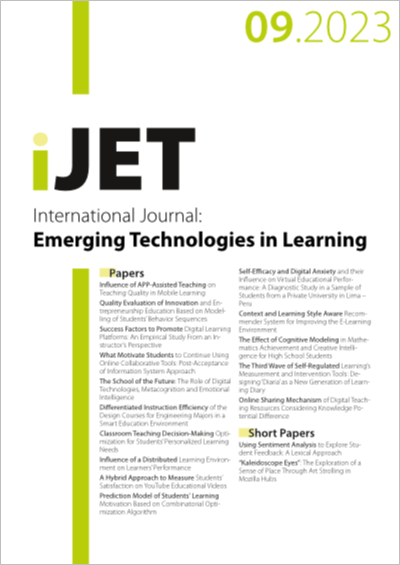Prediction Model of Students' Learning Motivation Based on Combinatorial Optimization Algorithm
DOI:
https://doi.org/10.3991/ijet.v18i09.40229Keywords:
combinatorial optimization, learning behavior intention prediction, learning autonomy evaluation, learning motivation analysisAbstract
The strength of college students' learning enthusiasm directly affects their learning effect. Studying and predicting students' learning enthusiasm has positive significance for improving college students themselves and college education. Existing methods have not involved how to select and extract features related to students' learning enthusiasm, so it is difficult to meet the needs of learning enthusiasm prediction. Therefore, this article takes English learning as an example to conduct a research on the prediction model of students' learning enthusiasm based on combinatorial optimization algorithm. Taking English learning as an example, this article expounds in detail the main manifestations of students' learning enthusiasm, and predicts the intention of students to participate in learning behaviors based on the enumerated behaviors, so as to judge students' learning enthusiasm, and gives the construction method of the prediction model. This study constructs a network model for the evaluation of students' learning autonomy, and finally outputs the grade results of students' learning autonomy evaluation. Based on the obtained predictions of students' participation in learning behavior intentions and the evaluation results of students' learning autonomy, a combined model is established through the weighting of the inverted error method to predict the regression of students' learning enthusiasm. Experimental results verify the effectiveness of the constructed single model and combined model.
Downloads
Published
How to Cite
Issue
Section
License
Copyright (c) 2023 Nan Zhang (Submitter); Weifeng Deng, Lin Wang

This work is licensed under a Creative Commons Attribution 4.0 International License.



